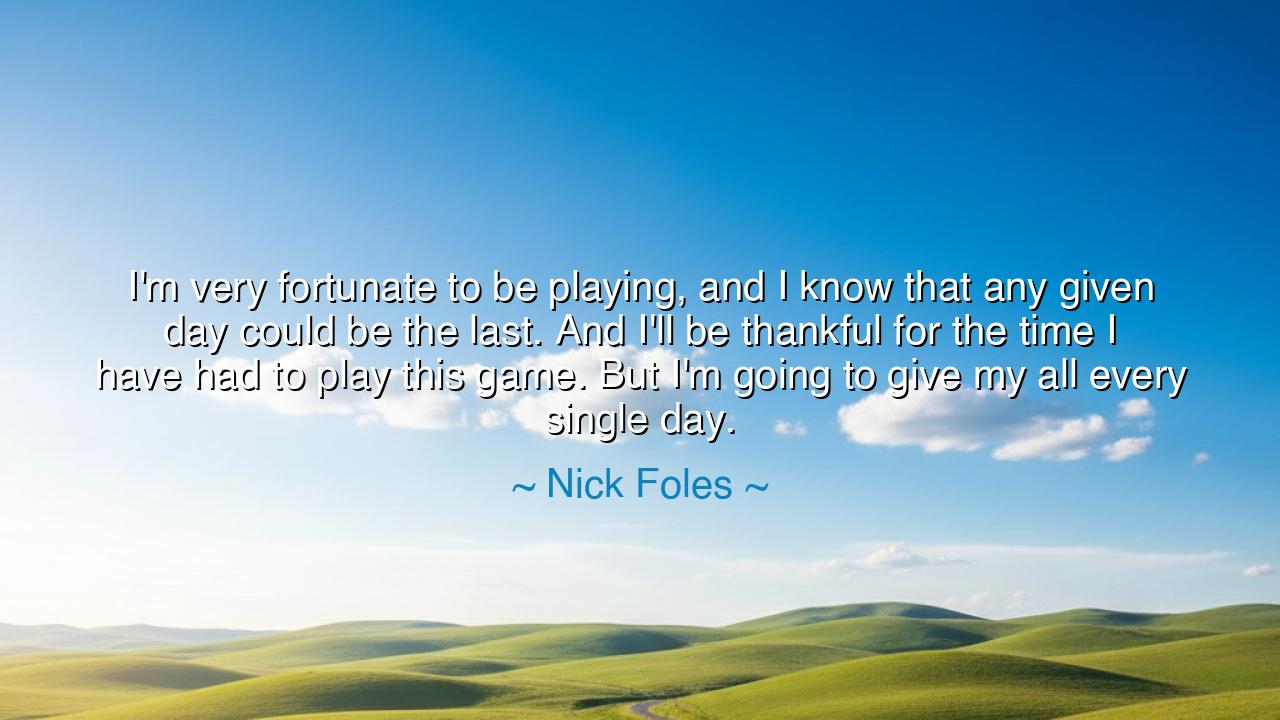
I'm very fortunate to be playing, and I know that any given day
I'm very fortunate to be playing, and I know that any given day could be the last. And I'll be thankful for the time I have had to play this game. But I'm going to give my all every single day.






When Nick Foles proclaims, “I’m very fortunate to be playing, and I know that any given day could be the last. And I’ll be thankful for the time I have had to play this game. But I’m going to give my all every single day,” he speaks as a man who has stood at the edge of uncertainty and chosen gratitude over fear. His words are not merely about sport, but about life itself—the fleeting nature of opportunity, the humility to cherish each moment, and the courage to pour oneself out completely while the chance remains.
The heart of this statement rests on the awareness of impermanence. Foles recognizes that in the world of professional football, careers can end suddenly—through injury, circumstance, or fate. This acknowledgment is not one of despair, but of clarity. By admitting that each day might be his last, he intensifies his devotion to the present, ensuring that every practice, every game, every snap is filled with his full measure of effort. This is the wisdom of mortality turned into motivation.
History offers many examples of this same spirit. Consider Lou Gehrig, who, in his farewell speech while facing a terminal illness, declared himself the “luckiest man on the face of the Earth.” Though his career ended abruptly, his gratitude and grace made him immortal in memory. Or look to Seneca, the Stoic philosopher, who taught that one must live each day as if it were complete, neither fearing the end nor wasting the present. Foles’ words align with these timeless teachings, showing us how gratitude transforms fragility into strength.
The second layer of his statement is found in his thankfulness. Many take their calling, their work, or their passions for granted, expecting tomorrow to look like today. But Foles teaches us that to be thankful is to guard against arrogance, to remember that the game is not owed to him but entrusted to him. Such gratitude softens the heart, turning pressure into privilege and transforming toil into joy.
Equally important is his declaration that he will give his all every day. Here lies the heroic essence: it is not enough to acknowledge the brevity of life, one must act upon it. His words are a vow to leave nothing undone, to meet every opportunity with full devotion. In this, he speaks to athletes, workers, artists, and dreamers alike: if the curtain fell today, let it fall on a stage where you gave everything you had.
This philosophy extends beyond sport. Every person has their own field of play—be it the classroom, the workplace, or the family home. Each of us faces the possibility that our time in that arena may end sooner than we imagine. The teaching of Foles is to live with both gratitude and exertion: to be thankful for the stage we are given and to perform upon it with courage and excellence.
So I say to you, children of tomorrow: do not waste your days in idleness or entitlement. Know that each sunrise is a gift, each chance to labor or love is precious, and each breath could be your last. Be thankful for the time you have, and give your all in whatever you are called to do. For in this way, like Nick Foles, you will transform fleeting moments into eternal testimony, and your life will echo long after the game has ended.






AAdministratorAdministrator
Welcome, honored guests. Please leave a comment, we will respond soon